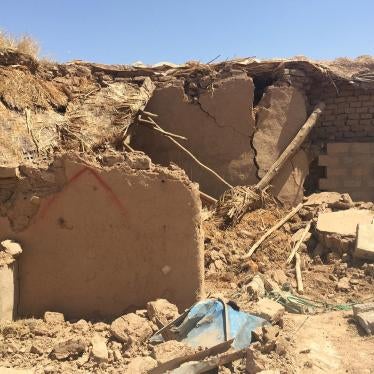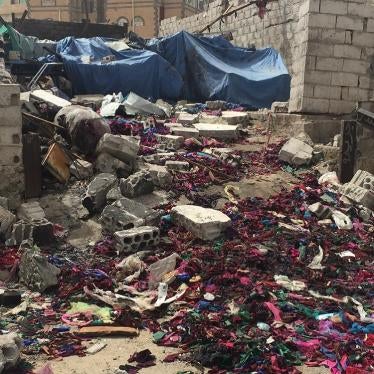The guards in the remote Libyan town of Zintan called their prisoner, Saif al-Islam Gaddafi, “our black box.” The second-oldest son of Muammar Gaddafi knew the secrets of Libya’s past, they said: Gaddafi’s deals with foreign governments and companies, the whereabouts of still-missing prisoners, the details of crimes committed during the regime’s failed attempt to crush this year’s popular revolt. Saif al-Islam, 39, had to be protected so Libyans and the world could learn what had really taken place. And for the guards in Zintan, a town of 50,000 atop a desert mountain, keeping Libya’s most-wanted man safe from the sort of frenzied opposition fighters who had apparently executed Saif’s father and brother Mutassim also offered a chance to patch up the country’s reputation for justice after the Oct. 20 killing of Muammar Gaddaf
As a special adviser for Human Rights Watch, I had arranged with the new Libyan government to interview Saif about the conditions of his detention after his arrest on Nov. 19 in the far south of his country. The International Committee of the Red Cross had visited four days into his detention, issuing a typically terse statement, and the public had not seen or heard from him since.
Saif entered the room draped in a large brown woolen cape with an embroidered fringe. He extended his left hand, keeping his right hand hidden beneath the cape. “Welcome to Zintan,” he said with an ironic smile, eliciting a chuckle from his captors and from me. The smile was bright. But Saif had lost the flair that I’d seen on television and heard about from those who had met him before. He had a scraggly beard and his once clean-shaven head was ringed by a horseshoe of graying hair. The setting was not what Libya’s heir-apparent would have been used to: a dimly lit room with a faded carpet and cushions along the edge. Two years ago he threw a lavish party for his 37th birthday on the coast of Montenegro; guests, reportedly, included Russian billionaire Oleg Deripaska and Prince Albert of Monaco.
Saif joked casually with the guards. “Ohhh, very good,” he said when they gave him his rimless glasses, which had been taken to Tripoli for repair. I thought his nonchalance suggested that he failed to grasp the gravity of his situation. Or maybe that’s how a person acts when born into a dictator’s family and is accustomed to solving all problems with orders or money.
Right now Saif al-Islam is currently in something of a jurisdictional limbo. According to Libya’s new chief prosecutor, Saif is under investigation for corruption prior to the uprising and for crimes he allegedly committed during the government’s violent crackdown this year. If convicted of the war-related crimes he could potentially be sentenced to death. At the same time, he is wanted by the International Criminal Court in The Hague for allegedly committing crimes against humanity during the early days of the crackdown, when government forces opened fire on peaceful protesters in the country’s east. Under UN Security Council Resolution 1970, which authorized the ICC investigation, the Libyan government is obliged to surrender Saif to The Hague. But Libya’s new rulers all told me that they are determined to try Saif at home. They can request permission from the ICC judges to do that, but they must argue in a legal submission that they will give the accused a fair trial on the same charges. One of my reasons for visiting Saif was to find out if he was receiving legal representation in preparation for his possible trial, wherever it may ultimately take place.
For 10 years the most prominent of Gaddafi’s children had offered many Libyans a glimmer of hope that liberalization might some day come to Libya. At the London School of Economics he obtained a Ph.D.; his thesis was titled The role of civil society in the democratization of global governance institutions: from ‘soft power’ to collective decision-making?At home in Libya, he pushed to release some political prisoners and widened the spectrum of debate in the closed and violently repressive state. He was responsible for bringing representatives of Amnesty International and Human Rights Watch into the country for the first time during his father’s rule, and for questioning the omnipotence of his father’s security apparatus. Were these genuine steps toward liberalization or was it all a ploy to curry favor in the West, where he was welcomed in the homes of influential billionaires and politicians? I don’t know, and Libyans are divided on that point. In the end, he failed to implement serious reform and his position in this year’s conflict was abundantly clear; he sided with his father in a brutal attempt to silence the Libyan people’s rage.
At first Saif’s guards did not want to leave us alone. They proposed staying, and then leaving us at the end for a few minutes so Saif could confirm in private whether everything he had said about his treatment was true. I politely declined. Unexpectedly, the guards offered no further resistance and agreed to leave the room.
We sat on cushions in the corner, talking in English. Saif seemed lucid and calm. He said he could read the books atop a dresser on one side of the room, but he had no access to newspapers, radio, or television. The food was good and the guards’ conduct fair, he said. “The treatment is OK; at least I’m in my own country,” he said. “There is no torture or anything like that.”
I asked about his right hand and he lifted it from beneath the cape. Fresh white bandages covered the thumb, index, and middle fingers. He slid the bandage off the thumb, and I saw a clean cut at the top knuckle where the upper thumb had been removed. He said the index finger was also cut off at the top, and the middle finger had a deep laceration from tip to base. “A doctor comes every week,” he said.
It’s commonly believed in Libya that the rebels who captured Saif cut his fingers off because he had wagged them on state television while giving a now-infamous speech at the beginning of the conflict. In the monologue, much viewed on television and YouTube, he repeated his offers of reform but promised the government would destroy the uprising, fighting “to the last man and woman and bullet.” But Saif dispelled the myth that his fingers had been cut off in revenge. “The hand injury happened in a NATO attack,” he said. I asked him when. “It was about two months ago. We were in a place called the Zimzim Valley—26 people were killed, my people.” As he spoke he cast his eyes down in an apparent moment of reflection. A Libyan doctor had performed an operation on the hand in the room where we were sitting, he said.
Saif said that the injury had, in fact, led to his arrest. Without giving specifics he explained that his injured hand had gotten into “bad shape” while on the run after his father’s death, so he had arranged to see a doctor in southern Libya. Opposition fighters found out about the appointment with the doctor and intercepted Saif and his entourage. (The guards had another version that was less complimentary to Saif: he was trying to flee the country when he was captured, they said. Someone had given them a tip.)
Saif did have one complaint. “The big problem,” he said of his conditions of detention, “is the total isolation.” Various government officials and military commanders had come to visit, including the “so-called prime minister,” he said. But he was unable to contact anyone of his own choosing, including by telephone.
That total isolation, I discovered, has resulted in Saif remaining without legal representation. “I need to contact my family or my friends in order to find a lawyer,” he told me.
Later I raised Saif’s need for a lawyer with the government. It’s a question that gets to the heart of what Libya will become: Will the new Libya grant detainees the rights that Muammar Gaddafi had denied to Libyans for so long? Will the new authorities give their most-wanted man the right to defend himself in a fair court of law? Saif is one of about 8,000 detainees in post-Gaddafi Libya, held by the government and dozens of militias, and all of them need a lawyer and a judge to promptly review the lawfulness of their detention.
The prosecutor said the state will allow Saif a lawyer after he is transferred to a more secure facility in Tripoli. I suggested that the government could grant access to a lawyer now, even in the difficult conditions of Zintan.
As we continued to talk I noticed further signs that Saif might not fully realize the perilous situation he finds himself in. He almost apologized for his captors when talking about the isolation. “It’s not because they want to harm me or offend me, but because of the situation,” he said of his guards. “This is also to protect me—I’m not a normal person.” His guards told me later, over lunch, that he talked of coming back to power.
Saif urged me to look into the 10,000 of “our people,” meaning supporters of his late father, who he said are currently detained by the new authorities. “They’re being held in Benghazi, Misrata, Tripoli, Zawiya, and Zintan,” he said, rattling off the Libyan cities and towns. “And there’s torture.” I was struck by his lobbying efforts, as if he still believed he held a leadership post. I told him we were monitoring the prisons and makeshift detention facilities closely and had documented some cases of abuse.
After 30 minutes the guards reentered the room, and I stood to take my leave. Saif had projected some authority while we spoke. But as we stood in the middle of the room, in remote Zintan, our left hands shaking goodbye, he held my eyes for a couple of moments too long. I wondered whether it was one more show of defiance or perhaps a betrayal of fear.
*Fred Abrahams is a special advisor at Human Rights Watch.*






